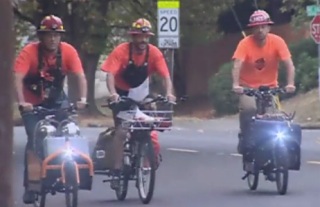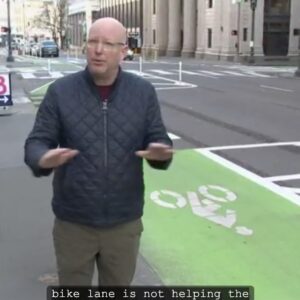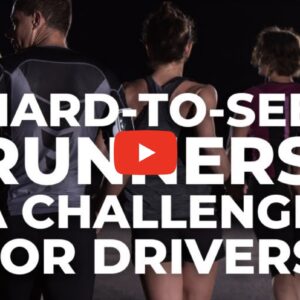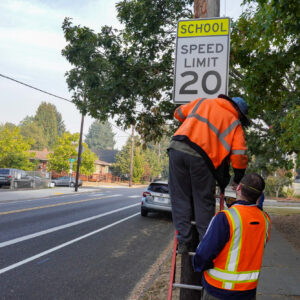
– Watch video below –
KGW TV (Portland’s NBC affiliate station) ran a feature segment last night about how cargo bikes will play a role in our disaster response plans. It’s a story we shared back in March, and after superstorm Sandy proved once again that bikes are the most reliable and resilient form of transportation after a major natural disaster, the story is even more timely.
“When roads are wiped out, and supplies scarce,” noted KGW reporter Abbey Gibb, “bikes can be a lifeline… Cargo bikes, and bikes in general, are the simplest answer.”
The story focused on the work being done by Woodlawn resident Ethan Jewett. Jewett is a leader of his local Neighborhood Emergency Team and he’s spearheading an effort to outfit cargo bikes as disaster response vehicles. He was also one of the organizers behind the Disaster Relief Trials event back in June.
Jewett’s NET unit (one of 12 throughout the city) can call upon a cavalry of cargo bikes (piloted by friends Travis Wittwer and Mike Cobb in the KGW story) that can haul huge loads of supplies and first aid equipment. A Yuba Mundo is outfitted with two stretchers, a Larry vs. Harry Bullitt carries a 1,800 watt generator, extra fuel, radio communications equipment, and more.
“If and when disaster strikes, his team and these bikes will be on the front lines.”
The KGW story also featured Randy Neves with the City of Portland’s Bureau of Emergency Management. “It’s just a great idea. These cargo bikes are potentially life saving equipment,” Neves told KGW, “Sometimes the only way to get them the supplies they need is with a bike and a bike that can carry all that heavy stuff.”
KGW reports that the City is now encouraging more NET teams to invest in cargo bikes. If they do, says Jewett, “It will translate into a more resilient community” after the Big One hits.
Perhaps this more mainstream coverage will inspire even more city officials and citizens to consider taking the role of cargo bikes in disaster response plans more seriously.







Thanks for reading.
BikePortland has served this community with independent community journalism since 2005. We rely on subscriptions from readers like you to survive. Your financial support is vital in keeping this valuable resource alive and well.
Please subscribe today to strengthen and expand our work.
When considering the disaster that cars have created in cities, all bicycles begin to take on an emergency response role on a daily basis.
KATU’s follow up story: How bikes to nowhere are stealing money from disaster relief
So far, these are just people’s own bikes, not bikes purchased with tax dollars.
I like the idea of bike trailer and cargo bike librairies where equipment gets used, worn out, and replaced during “peace time”. This “library fleet” would also come in handy when disaster strikes. There are efforts underway, none of which involve tax dollars.
I can imagine many ways to capitalize on the power of the cargo bike in a disaster environment. Most of what I imagine involves no or very little tax money. It just doesn’t take that much leverage to sprinkle trailers and cargo bikes around. It doesn’t have to be partisan and in the case of “peace time” equipment libraries, we could reasonably talk about a reasonable payback rate on a reasonably small seed investment.
The point is, cargo bikes are useful NOW. Getting more cargo bikes to more families NOW + further developing cargo bike-related disaster protocol = exciting disaster preparedness with a tiny price tag.
Hats off to all involved! I’m proud to live in a city that yields/allows/encourages/celebrates this kind of stuff. Thanks, Jonathan, too.
Big ol’ newsflash eh? Like bikes aren’t the “simplest answer” every day? Can’t say that on TV though — not when most of the advertising is for cars and for drugs people wouldn’t need if they biked.
On the other hand, since today’s Election Day, I’m probably going to be relieved tomorrow when all the expensive corporate lies go back to being about cars and drugs. Oh yeah and food.
It’s no surprise here that bikes can do where others can’t… I’ve seen so many pictures of pedal powered contraptions loaded with “impossible” loads tooling around in the 3rd world nations over the years. What is surprising is that it’s taking so long for the idea to filter back to us.
“What is surprising is that it’s taking so long for the idea to filter back to us.”
Or maybe not so surprising. Cars are not just objects, like water heaters or extension ladders or handkerchiefs. Cars–and the physical infrastructure as well as the social norms which keep them at the center of our lives–have colonized our imaginations, our habits. Most people probably don’t think of not relying on their car anymore than the rest of us think about not having drinking water coming out of the tap. In that absence there’s really very little need for most people to ever consider, say, cargo bikes, or disasters, or any of a thousand other practical matters that our collective addiction to cars renders invisible, unthinkable.
Great idea, gonna make My Mundo ready for this!
I applaud Ethan and Travis for getting up and getting their initiative going, but even though I am a fellow cargo bicyclist, I would like to disagree with the basic premise, that cargo bikes offer more than just cosmetic relief.
Bottom line up front: if I have to provide disaster relief for a group of people, I want to be using a truck. Trucks hold more and don’t get tired.
It would make more sense to have truck “libraries” on every block. In ordinary times, these vehicles could be operated by their owners; in the aftermath of a disaster, they would be used for disaster relief and the families who ordinarily rely on them would take bicycles around instead.
I believe that the omnipresence of American drivers, who are used to operating their motor vehicles in an utterly self-interested manner, have led us bicycle advocates to ignore the obvious benefits of trucks over bikes for this use. If private vehicles were banned from roads in the days after a disaster, then the gas they demand could be used instead for fueling private-fleet pickups and SUVs to provide disaster relief, perhaps with trailers to carry even larger loads.
Instead, we have a situation where families buy Toyota Tundras and Chevy Suburbans for the express purpose of being able to ferry their three or four members and impedimenta around in all kinds of weather, leaving our fellow community-minded bicyclists pick up the disaster-recovery slack.
Does it make sense to have both modes exploited for their respective abilities?
Jonathan,
within our society (transportation, food, safety, etc.) that is so completely dependent on fossil fuels your suggestion is at once familiar but also misplaced. One point of focusing on human powered means of disaster relief is that the continued availability of cheap gas and diesel both in a disaster and in the future is far from assured.
Assembling a fleet of vehicles, counting on them to be available in a disaster, when the fuel they require can’t be guaranteed doesn’t seem very resilient. Of course a truck can haul more than a cargo bike, but the question in my mind is when that distinction ceases to be the relevant one.
My take is that we’re going to have to figure out how to live without fossil fuels one of these days anyway, disaster or no disaster. So there’s very little reason to postpone the inevitable, not to mention thrilling, transition away from them.
Furthermore, your idea of having trucks stationed on every block in a disaster presumes that at the next several scales up there will also be trucks capable of moving freight that these block level trucks can then distribute. I wouldn’t count on that either. You need intact roads for all this to work, and the kind of disaster we can expect probably won’t include that.
Cargo bike relief ceases to be cosmetic as soon as it’s discovered to be the only game in town.
9watts,
We have a responsibility to our fellow citizens to provide relief when it’s needed in the most effective way possible. I don’t dispute the value of planning for a petroleum-free recovery effort, but it seems to me that committing resources to those plans while petroleum is readily available may be wasteful and misguided.
Creating a last-mile logistics resource to ensure delivery of needed supplies implies that the supplies are actually there, available to be distributed. If these are prepositioned supplies, there’s no reason why adequate fuel to distribute them cannot be prepositioned. If the supplies are being brought from outside the disaster zone, then fuel for the last-mile distribution can be brought as well. If there are no supplies to distribute, then there is no point in creating a delivery network; we would just be shifting stocks of toilet paper and other necessities from one house to another on an ad hoc basis.
I understand that in Portland the big fear is of an earthquake; I write from New York City, where disaster planning is focused on recovering from floods. In a flood situation, trucks and bikes have roughly equal mobility.
You write – “while petroleum is readily available”
Petroleum is readily available only in one (admittedly pragmatic) sense. You can still buy it cheap at the nearest gas station.
But notwithstanding present day economics we are beginning to grapple with the fact that we’re supposed to leave all of what we haven’t already burned in the ground to avert climate catastrophe–what we might consider an ongoing disaster. This is true today and it will be true tomorrow and abundantly so in five or ten years. The disaster we may be planning for could be tomorrow or in fifteen years. Or it could be brought on or exacerbated by our unwillingness to face the ‘end of predictable climate’ music.
My understanding of “peak oil” as a concept is that it refers to the moment in time when petroleum production reaches a maximum. It doesn’t mean that come some arbitrary date, there will be no more petroleum being produced. I would assume that in the case of a severe earthquake, the strategic petroleum reserve would be tapped for relief purposes.
I also don’t concur with your unspoken assumption that the government would not use all its available resources–including those petroleum reserves–to help citizens affected by a truly huge disaster like the anticipated West Coast earthquake.
“the government would not use all its available resources–including those petroleum reserves–to help citizens”
Of course the government would (especially if they’re white), but this is the same government that would build the CRC and use drones and pretend climate change does not concern us. I’m not particularly interested in what ‘the government’ would or wouldn’t do at this point. I’m interested in figuring out strategies that enhance our resilience, that reflect the realization that fossil-fuel based systems are anathema to future resilience, whether or not we have the anticipated disaster. My take on Ethan and Travis and Mike’s efforts with cargo bikes is that–among other things–they are pushing those in government to think more expansively about disaster relief; articulating and demonstrating a human-powered approach those in government wouldn’t have thought of on their own.
My point about needing to leave still unextracted oil and gas and coal in the ground has nothing to do with Peak Oil and everything to do with atmospheric carbon concentrations and our evolving understanding of what levels are compatible with our health and wellbeing.
Portland’s disaster plan includes fuel rationing, whereby private autos are not privy to petrol under dire disaster conditions.
I think part of the issue is that much of the infrastructure required by trucks is likely to be “out of service”. Roads will be broken up in ways that even trucks can’t get through in a timely manner.
And, as Sandy has shown, gas is the real issue. Even where there is plenty of it, it requires electricity to move from the ground into the vehicle. If power were out for weeks, as is likely to be the case in the aftermath of the Big One (anyone else holding the thought of the two EQs in the last 24 hours close in mind?), gas gets scarce REAL quick.
I also thought immediately of Zipcars, which have Tacomas around town. But, even that system may be down for the count in a power outage, since it requires satellite communication to unlock the vehicle for use.
I have a pickup, and I’ll happily use it or loan it as needed to help with whatever I can. But I’m also looking in to ways I can haul my canoe by bike to pick up my GF from across the river after all the bridges fall into the water…
Really, why not utilize ALL the resources we can muster, including cargo bikes and trailers?
Using an all-hazards model, your chief assumption is kind of unlikely. Flooding, fires, heat waves, cold snaps, heavy snow, heavy rain, wind storm, ice storms and blackouts are disasters that wouldn’t affect the road system in the same way as an earthquake.
Here’s a story about cargo bike owners who found important uses for their rigs, post-storm:
http://m.theatlanticcities.com/neighborhoods/2012/11/power-bicycles-disaster-recovery/3834/
I’d like Portland to create systems that channel the enthusiasm and power of private cargo bike owners during times of broken transportation infrastructure and utterly occupied first responders.
Cargo bikes would be a valuable addition to a community stash of emergency supplies. A runner could run needed supplies from his neighborhood over to another neighborhood that is in dire need of a particular item, first aid supplies, triage supplies….
The only problem is, we are lacking neighborhood emergency stashes of emergency equipment and supplies. If something were to happen today we are basically on our own until red cross or fema can get in, this might be many days or weeks.The first aid supplies that the net people have right now are for their own use, not for the neighborhood people. There have been efforts to create neighborhood stashes but so far nothing has happened.
The Sunnyside Neighborhood is working on this very thing. Finding suitable space is harder than finding the supplies.